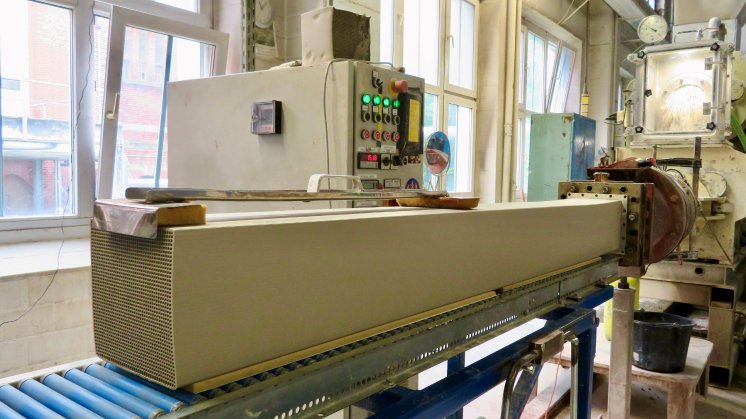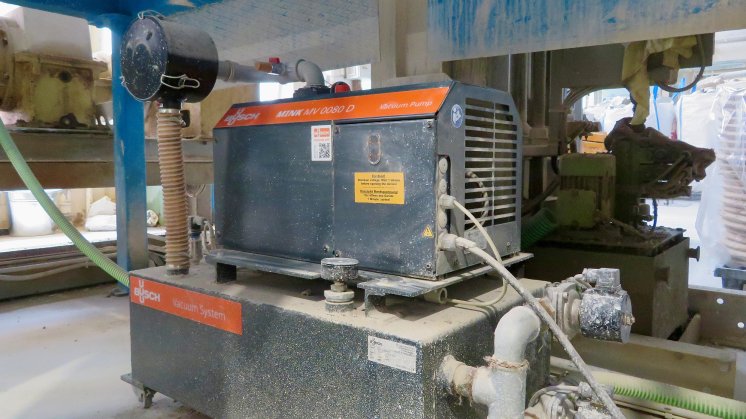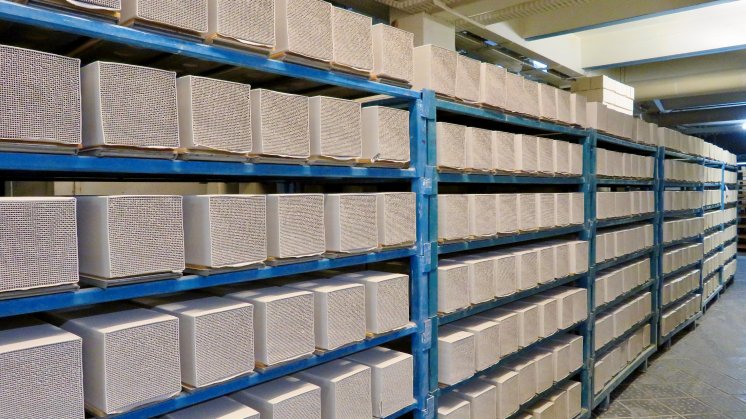Industrial ceramics have been produced in Hermsdorf, near Jena, since 1890. In the past, high-voltage insulators; now, ceramic honeycomb bodies for heat exchangers, ventilation and emission control systems. They have always kept up with the times, developing innovative materials, products and state-of-the-art production processes to do so. Just like the two new SIMPLEX vacuum systems from Busch that are used to degas the ceramic mass. In 2021, these replaced four oil-lubricated rotary vane vacuum pumps and have been providing four extrusion lines with the required vacuum ever since. More than 100 employees currently work in the historic halls of the porcelain factory.
1600 holes, no air bubbles
The strand of square-shaped ceramic, still damp, slides smoothly out of the screw press. But after 1.50 metres, the race is over. Clever hands then cut off the front piece and place it on a large rack to dry. They do this continuously in three shifts. After around nine days, when the mass only contains one percent residual moisture, the honeycombs are fired in an oven at 1,200 degrees. 1,600 small holes run through them lengthwise like honeycomb cells, separated only by fine walls, all precise and symmetrical. To ensure that this remains the case after the combustion process, the mass must not contain any air pockets. These would expand with the heat in the oven and cause the entire honeycomb body to burst. For this reason, the mass must be degassed beforehand with SIMPLEX vacuum systems from Busch. At the heart of each control cabinet and vacuum vessel is a MINK MV Synchro dry claw vacuum pump. What other vacuum pumps see as a challenge, namely handling very moist, paste-like masses, they can master with ease. This is precisely why they have been developed for extruder degassing.
No muddy matter
The previously used oil-lubricated rotary vane vacuum pumps did not cope as well with the process conditions. "The oil quickly became an emulsion with the condensed water vapor. They were noisy, they stank, and the filters were permanently clogged. This resulted in excessive wear and pump failure. Once a month we had to change the filters and oil, which was a lovely muddy job," says Christian Ferber, Managing Director of Porzellanfabrik Hermsdorf GmbH. The new SIMPLEX VO vacuum systems from Busch are completely different. They do not require oil in the compression chamber and are virtually maintenance-free, quiet and frequency controlled. While the previous pumps were constantly running and had to be manually controlled by means of false air valves, the new vacuum systems from Busch automatically adapt to the required vacuum level and switch off when no vacuum is required. "We initially used a Busch loaner system for testing purposes and were immediately impressed. We are still completely satisfied with our own SIMPLEX systems today. In terms of maintenance, the new systems really make things much easier," says Christian Ferber.
From Hermsdorf to the world
Two energy-saving, extremely low-maintenance dry standard systems that replace four old, energy- and maintenance-intensive oil-lubricated pumps: "Thanks to the good advice we received from Busch, we have saved 10,000 kWh per year. Since installation, the two vacuum systems have been running absolutely trouble-free. There’s no comparison with the predecessor pumps at all," says Christian Ferber. And thanks to the new vacuum solution from Busch, 80,000 to 90,000 high-quality honeycomb bodies in various shapes and sizes leave the traditional plant in Hermsdorf every month. They ensure efficient heat recovery and clean air in ventilation systems of passive houses or afterburning plants on large container ships and cruise ships worldwide.



